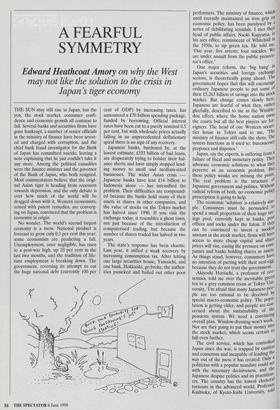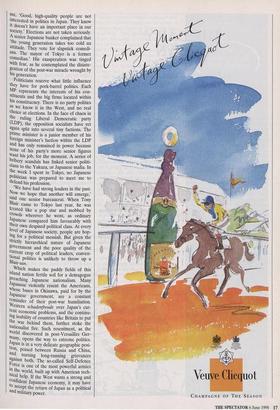A FEARFUL SYMMETRY
Edward Heathcoat Amory on why the West may not like the solution to the crisis in Japan's tiger economy THE SUN may still rise in Japan, but the yen, the stock market, consumer confi- dence and economic growth all continue to fall. Several banks and securities firms have gone bankrupt, a number of senior officials in the ministry of finance have been arrest- ed and charged with corruption, and the chief bank fraud investigator for the Bank of Japan has committed suicide, leaving a note explaining that he just couldn't take it any more. Among the political casualties were the finance minister and the governor of the Bank of Japan, who both resigned. Most commentators believe that the origi- nal Asian tiger is heading from recession towards depression, and the only debate is over how much of the world will be dragged down with it. Western economists, armed with patent remedies, are converg- ing on Japan, convinced that the problem is economic in origin.
No wonder. The world's second largest economy is a mess. National product is forecast to grow only 0.3 per cent this year; some economists are predicting a fall. Unemployment, once negligible, has risen to a post-war high, up 20 per cent in the last two months, and the tradition of life- time employment is breaking down. The government, reversing its attempt to cut the huge national debt (currently 100 per cent of GDP) by increasing taxes, has announced a £70 billion spending package, funded by borrowing. Official interest rates have been cut to a purely nominal 0.5 per cent, but with wholesale prices actually falling in an unprecedented deflationary spiral there is no sign of any recovery.
Japanese banks, burdened by, at the lowest estimate, £333 billion of bad loans, are desperately trying to bolster their bal- ance sheets and have simply stopped lend- ing money to small and medium-sized businesses. The wider Asian crisis — Japanese banks have lent £14 billion to Indonesia alone — has intensified the problem. Their difficulties are compound- ed because the banks hold many of their assets in shares in other companies, and the value of stocks on the Tokyo market has halved since 1990. If you visit the exchange today, it resembles a ghost town, not just because of the introduction of computerised trading, but because the number of shares traded has halved in two years.
The state's response has been chaotic. Last year, it stifled a weak recovery by increasing consumption tax. After letting one large securities house, Yamaichi, and one bank, Hokkaido, go broke, the author- ities panicked and bailed out other poor performers. The ministry of finance, which until recently maintained an iron grip ohi economic policy, has been paralysed by ? series of debilitating scandals. I met their head of public affairs, Naoki ICajiyama, ul his airy office, reminiscent of Whitehall in the 1950s, to sip green tea. He told me, 'One year, five arrests, four suicides. We are under assault from the public prosecu- tor's office.'
One major reform, the 'big bang' ill Japan's securities and foreign exchange sectors, is theoretically going ahead. The government hopes that this will encourage ordinary Japanese people to put some of their £5,263 billion of savings into the stock market. But change comes slowly here. Japaneseare fearful of what they, rather gleefully, described to me as the Wimble- don effect, where the home nation owns the courts but all the best players are for; eigners. The head of one Western securi- ties house in Tokyo said to me, 'The ministry of finance still calls the shots. The system functions as it used to: bureaucracY proposes and disposes.' Japan, say the experts, is suffering from a failure of fiscal and monetary policy. They advocate economic solutions to what they perceive as an economic problem. But these policy wonks are missing the point. The real problem is the structure Cf Japanese government and politics. Without radical reform of both, no economic policY prescription is going to help. The economic 'solution' is relatively sint- ple. Consumers must be persuaded t° spend a small proportion of their huge say yap pool, currently kept in banks, Post offices and socks under the futon. If the) can be convinced to invest a modest amount in the stock market, firms will have access to more cheap capital and share prices will rise, easing the pressure on Cour' panies and banks holding shares as assets' As things stand, however, consumers have no intention of parting with their nest-egg, because they do not trust the government. Akiyoshi Horiuchi, a professor of eco- nomies, told me over the inevitable greet' tea in a grey common room at Tokyo U111- versity, 'I'm afraid that many Japanese peo- ple are too rational to be deceived by special macro-economic policy. The popu- lation is getting older, and people are Wu- cerned about the sustainability of pensions system. We need a convincing overall plan. Window-dressing won't work. Nor are they going to put their money inr° the stock market, which seems certain td3 fall even further. The civil service, which has controlled Japan since the war, is trapped by caution` and consensus and incapable of leading the way out of the mess it has created. OnlY 3 politician with a popular mandate could act with the necessary decisiveness, and _the Japanese despise politics and its practition: ers. The country has the lowest electoral turnouts in the advanced world. Professo,,r Kashioka, of Kyoto-Joshi University, told me, 'Good, high-quality people are not interested in politics in Japan. They know it doesn't have an important place in our society.' Elections are not taken seriously. A senior Japanese banker complained that the young generation takes too cold an attitude. They vote for slapstick comedi- ans. The mayor of Tokyo is a former comedian.' His exasperation was tinged With fear, as he contemplated the disinte- gration of the post-war miracle wrought by his generation.
Politicians reserve what little influence they have for pork-barrel politics. Each MP represents the interests of his con- stituents and the big firms located within his constituency. There is no party politics as we know it in the West, and no real choice at elections. In the face of chaos in the ruling Liberal Democratic party (LDP), the opposition socialists have yet again split into several tiny factions. The Prime minister is a junior member of his foreign minister's faction within the LDP and has only remained in power because none of his party's more senior figures want his job, for the moment. A series of bribery scandals has linked senior politi- cians to the Yakuza, or Japanese mafia. In the week I spent in Tokyo, no Japanese Politician was prepared to meet me to defend his profession. We have had strong leaders in the past. Now we hope that another will emerge,' said one senior bureaucrat. When Tony Blair came to Tokyo last year, he was treated like a pop star and mobbed by crowds wherever he went, as ordinary Japanese compared him favourably with their own despised political class. At every level of Japanese society, people are hop- mg for a political messiah. But given the strictly hierarchical nature of Japanese government and the poor quality of the current crop of political leaders, conven- tional politics is unlikely to throw up a Blair-san.
Which makes the paddy fields of this island nation fertile soil for a demagogue Preaching Japanese nationalism. Many Japanese violently resent the Americans, Whose bases in Okinawa, paid for by the Japanese government, are a constant reminder of their post-war humiliation. Western schadenfreude over Japan's cur- rent economic problems, and the continu- ing inability of countries like Britain to put the war behind them, further stoke the nationalist fire. Such resentment, as the world discovered in post-Versailles Ger- many, opens the way to extreme politics. Japan is in a very delicate geographic posi- tion, poised between Russia and China, and nursing long-running grievances against both. The so-called Self-Defence Force is one of the most powerful armies in the world, built up with American tech- nical help. If the West wants a strong and confident Japanese economy, it may have to accept the return of Japan as a political and military power.



























































 Previous page
Previous page